Table of Contents
Get started with MyPerfectResume today!
- Build a resume on any device
- Pick an ATS-friendly template
- Tailor with AI copy suggestions
Why this resume works
- Quantifies accomplishments: By citing a 25% increase in team win rate and a 15% skill improvement, the applicant’s achievements effectively communicates their tangible impact and value.
- Showcases career progression: The path from junior coach to head coach displays significant career progression, reflecting growing expertise and responsibility in shaping successful teams over consecutive positions.
- Uses action-oriented language: Action verbs like “implemented” and “coordinated,” highlight the applicant’s proactive approach and leadership capabilities.
More Football Coach Resume Examples
Browse our football coach resume examples to learn how to highlight your leadership, strategy development, and player management skills. These sports resume samples will guide you in crafting a resume that impresses potential teams and organizations.
Entry-Level Football Coach
Why this resume works
- Centers on academic background: By showcasing a master’s degree in sports management in the education section, the applicant emphasizes a strong academic foundation early in their coaching career.
- Shows digital literacy: Implementing a digital tracking system for player performance reflects the applicant’s computer skills needed for today’s tech-driven environments.
- Effective use of keywords: Strategically using terms like “team leadership” and “strategy development” helps ensure the resume aligns with keywords that catch a applicant tracking systems (ATS) filters.
Mid-Level Football Coach
Why this resume works
- Points to measurable outcomes: By illustrating a 45% boost in team win rates and improving athlete stamina by 25%, the applicant effectively showcases their impact through quantifiable outcomes.
- Demonstrates language abilities: Knowledge in Spanish, French, and German enriches language skills for coaching diverse teams and engaging with international athletes.
- Displays technical expertise: Possessing certifications like Certified Football Coach highlights technical expertise important for strategic planning and athlete development in sports management.
Experienced Football Coach
Why this resume works
- Showcases impressive accomplishments: By emphasizing achievements like leading teams to three championships, the applicant’s accomplishments in coaching reveal a knack for transformative team performance and strategic leadership.
- Focuses on work history: A chronological resume format showcases the applicant’s extensive career, from youth sports coordinator to football coach, effectively mapping out growth and expertise over time.
- Sections are well-organized: Strategic use of bullet points and clear headers ensures each section is easy to navigate, making the resume reader-friendly and well-structured for quick scanning.
Football Coach Resume Template (Text Version)
Jin Lee
Riverside, CA 92507
(555)555-5555
Jin.Lee@example.com
Professional Summary
Dynamic football coach with 7 years experience in team leadership, performance analysis, and player development. Increased team win rates by 25% and developed effective game strategies. Committed to fostering talent and enhancing sports performance.
Work History
Football Coach
Prime Athletics Academy – Riverside, CA
January 2023 – August 2025
- Increased team win rate by 25%
- Coached players to improve skills by 15%
- Implemented a fitness program improving stamina
Assistant Football Coach
Victory Sports Club – Riverside, CA
June 2019 – December 2022
- Assisted in enhancing player nutrition plans
- Coordinated training sessions, reducing injuries by 20%
- Developed a scouting strategy, increasing talent pool
Junior Football Coach
Greenfield High School – San Francisco, CA
June 2016 – May 2019
- Led team to win Regional Championship
- Introduced video analysis, improving tactics 30%
- Organized fundraising, raising $5,000 for gear
Languages
- Spanish – Beginner (A1)
- French – Beginner (A1)
- Italian – Beginner (A1)
Skills
- Tactical Planning
- Team Leadership
- Performance Analysis
- Player Development
- Fitness Programming
- Recruitment
- Motivational Coaching
- Game Strategy Formulation
Certifications
- Certified Football Coach – National Coaching Federation
- Sports Nutrition Specialist – American Sports Institute
Education
Master’s Degree Sports Management
University of California Los Angeles, California
June 2016
Bachelor’s Degree Physical Education
University of California Berkeley, California
June 2014
Related Resume Guides
Advice for Writing Your Football Coach Resume
Dive into our advice section on how to write a resume for a football coach position, where you’ll discover tailored tips to highlight your coaching skills and leadership qualities.
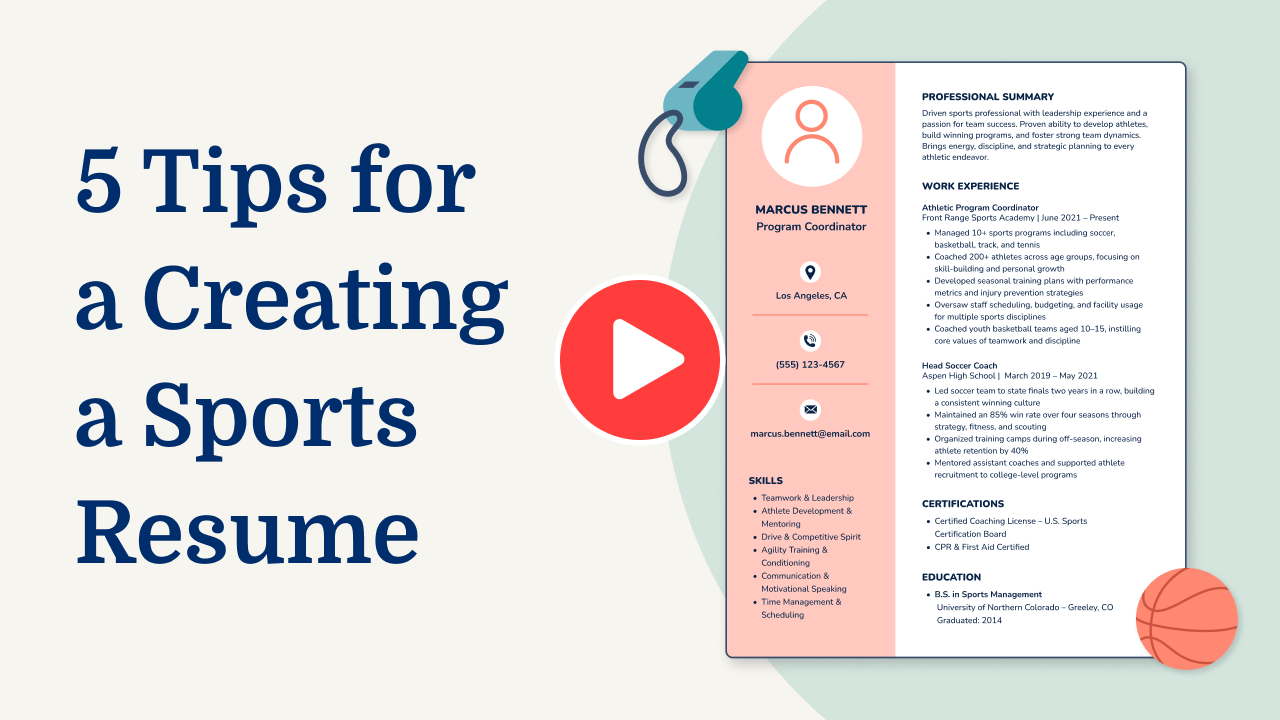
Write a strong professional summary
A professional summary on a resume acts as an introduction to hiring managers, helping them quickly understand who you are and what you bring to the table.
Typically three to four sentences long, a professional summary showcases experience, skills, and achievements. It’s best for those with some work history, such as experienced football coaches. The purpose of a professional summary is to highlight your professional identity and value in the coaching field.
Conversely, resume objectives focus on career goals and are ideal for entry-level job seekers, career changers, or people with employment gaps. While a summary says “what I’ve accomplished,” an objective explains “what I aim to contribute” as a coach.
Next, we’ll look at examples of both summaries and objectives across various industries and experience levels to help you choose the best fit for your situation as a football coach.
Football coach resume summary examples
Entry-level
Recent sports science graduate with a focus on football coaching, holding a National D Coaching License. Experience as an assistant coach for local youth teams, emphasizing skill development and teamwork. Strong foundational knowledge in game strategies, player conditioning, and injury prevention. Passionate about fostering young talent and promoting sportsmanship.
Mid-career
Dedicated football coach with over seven years of experience coaching high school varsity teams and managing training programs. Skilled in developing game plans, conducting practice sessions, and analyzing team performance to improve gameplay. Certified by the United Soccer Coaches Association and known for leading teams to regional championships through motivational leadership and strategic planning.
Experienced
Veteran football coach with over 15 years of experience at collegiate level, specializing in player development and advanced game tactics. Proven track record of leading teams to national playoffs and mentoring players who have progressed to professional leagues. Holds a UEFA A Coaching License and expertise in sports analytics to drive team success. Committed to fostering a culture of excellence both on and off the field.
Football coach resume objective examples
Entry-level
Aspiring football coach with a background in sports science and youth mentoring, aiming to contribute to a high school team. Eager to apply knowledge of game strategies and player development while fostering teamwork and sportsmanship among young athletes.
Career changer
Dedicated professional transitioning from physical education teaching to football coaching, bringing strong communication skills and a passion for athlete development. Looking forward to guiding student-athletes in achieving both personal and team goals through effective training programs.
Recent graduate
Recent graduate with a degree in sports management seeking an entry-level football coaching position. Committed to leveraging leadership abilities and tactical understanding gained through collegiate athletics experience to support team success and growth.
Get noticed faster by using our Resume Builder to craft your football coach resume. Choose a template, add your details, and make a standout resume quickly!
Include relevant certifications and training
Listing certifications and training is important for a football coach because it shows your skills and knowledge in the sport. Certifications prove you have completed courses that teach you how to train players, plan games, and keep everyone safe.
They help teams know you are prepared to handle different situations on and off the field. Having a certifications section on your resume can make it stand out alongside your education.
- USA Football Heads Up Certification
- National Federation of State High School Associations (NFHS) Coaching Certification
- American Sport Education Program (ASEP) Coaching Certification
- Certified Strength and Conditioning Specialist (CSCS)
- CPR and First Aid Certification
These certifications show you’re ready to lead as a football coach. They highlight your dedication to learning and improving coaching skills. This helps build trust with players, parents, and administrators.
Example of a certifications section
United Soccer Coaches National Diploma
Issued by: United Soccer Coaches
Issued 2022
USSF ‘C’ License
Issued by: U.S. Soccer Federation
Expires 2025
First Aid and CPR Certification
Issued by: American Red Cross
Issued 2023
NSCAA Advanced National Diploma
Issued by: National Soccer Coaches Association of America (NSCAA)
Issued 2021
Select a polished resume template that features professional fonts, consistent margins, and simple design elements to ensure your qualifications shine.
Showcase your work experience
When applying for a football coach position, showcasing your work experience is essential to standing out. Begin with your most recent job and list each one in reverse chronological order. For every role, include your title, employer’s name, location, and the dates of employment.
Use clear language to convey what you accomplished in each position. Quantify achievements when possible, such as “improved team win rate by 20%,” to clearly demonstrate how you’ve made an impact.
Focus on responsibilities important for a football coach, like developing training plans, leading practices, analyzing game footage, or mentoring players. Strong action words make your experience sound compelling and direct.
Instead of vague descriptions, specify tasks like “designed workout programs” or “motivated players to excel.” Highlight any success stories where you’ve helped athletes improve their skills or led teams to championships.
By effectively presenting your work history and accomplishments as a football coach, employers can quickly gauge how you’ve contributed in past roles. This method not only highlights your abilities but also communicates that you’re prepared to deliver similar successes for their team. Keep it simple and focused on results so anyone reading can easily grasp the impact you’ve had as a coach.
5 football coach work history bullet points
- Led the team to a state championship victory, increasing win rate by 40% over the previous season.
- Developed and implemented strategic playbooks, resulting in a 25% improvement in offensive plays.
- Mentored athletes on skill development and sportsmanship, leading to 3 players receiving college scholarships.
- Organized weekly training sessions that improved player fitness levels by 30%, as measured by performance metrics.
- Coordinated with assistant coaches to streamline practice schedules, reducing preparation time by 20%.
For football coaches, choose a resume format that highlights your coaching experience, leadership skills, and success in developing player talent.
Match your resume with the job description
Tailoring your resume to a job description is essential for standing out to employers and passing through ATS. The software scans resumes for specific keywords and phrases from job postings, making this alignment important for getting noticed.
An ATS-friendly resume uses keywords and phrases that match the job posting. Aligning these terms with your skills and experiences increases the chances of your resume catching the eye of hiring managers.
To identify these keywords, closely examine the job posting for repeated skills, qualifications, and duties. For example, if you’re applying as a football coach, look for terms like “team leadership,” “game strategy,” or “player development” to guide your resume language.
Incorporate these terms naturally into your application by rewriting job descriptions. Instead of saying “led team practices,” you might write “developed game strategies during team practices to improve performance.”
Targeted resumes improve ATS compatibility by ensuring key phrases are present in your application. When you customize your resume, you increase the likelihood of progressing to the interview stage.
Make sure your resume shines! Use our ATS Resume Checker to find and fix formatting mistakes, missing keywords, or other problems before sending it to employers.
FAQ
Do I need to include a cover letter with my football coach resume?
Yes, including a cover letter with your football coach resume can improve your application and make you more memorable to hiring committees.
A cover letter allows you to express your passion for coaching and detail specific experiences, like leading a team to victory or developing a successful training program.
If the school or club has a distinct philosophy or notable achievements, you can mention your alignment with their values or how you’ve contributed to similar successes in the past.
Consider using a Cover Letter Generator to create a tailored cover letter that highlights your strengths, ensuring it’s both professional and personal.
Additionally, reviewing cover letter examples specific to coaching roles can provide inspiration and ensure you’re addressing key points that appeal to athletic directors or hiring managers.
How long should a football coach’s resume be?
For a football coach, a one-page resume effectively highlights key accomplishments like coaching experience, leadership skills, and certifications. This format works well for those early in their career or with focused achievements.
If you’ve had an extensive coaching career or held multiple significant positions, a two-page resume might be more appropriate. It allows you to detail your strategic impact on teams and any championships or awards won without crowding the information.
Explore our guide on how long a resume should be for tips on choosing the right length based on your specific coaching journey.
How do you write a football coach resume with no experience?
To create a resume with no experience for a football coach, focus on your passion for the sport and any related skills or activities that demonstrate your potential as a coach. Follow these tips:
- Leverage your educational background: If you studied sports science, physical education, or took coaching-related courses, highlight these. Include any workshops or certifications you’ve completed that are relevant to coaching.
- Showcase transferable skills: Focus on skills like leadership, communication, teamwork, and strategy development. Mention experiences where you demonstrated these abilities, whether in other jobs, volunteering, or playing sports.
- Include volunteer and informal coaching roles: Detail any involvement in local sports clubs, youth teams, or school programs where you helped guide players. Even if unpaid, these experiences are valuable evidence of your commitment and capability.
Rate this article
Football Coach
Share this page
Additional Resources
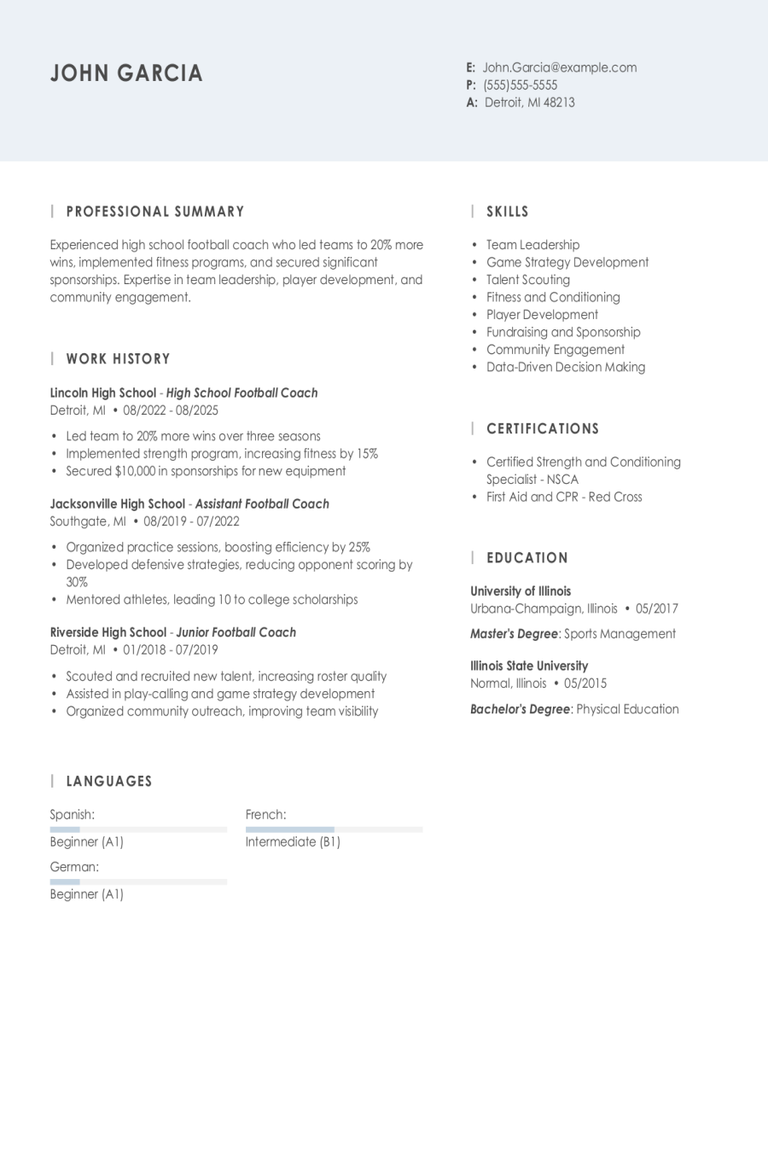
High School Football Coach Resume Examples & Templates
Browse high school football coach resume examples and learn how to show you lead a team, plan practices, and motivate players.Build my resumeImport existing resumeCustomize this templateWhy this resume
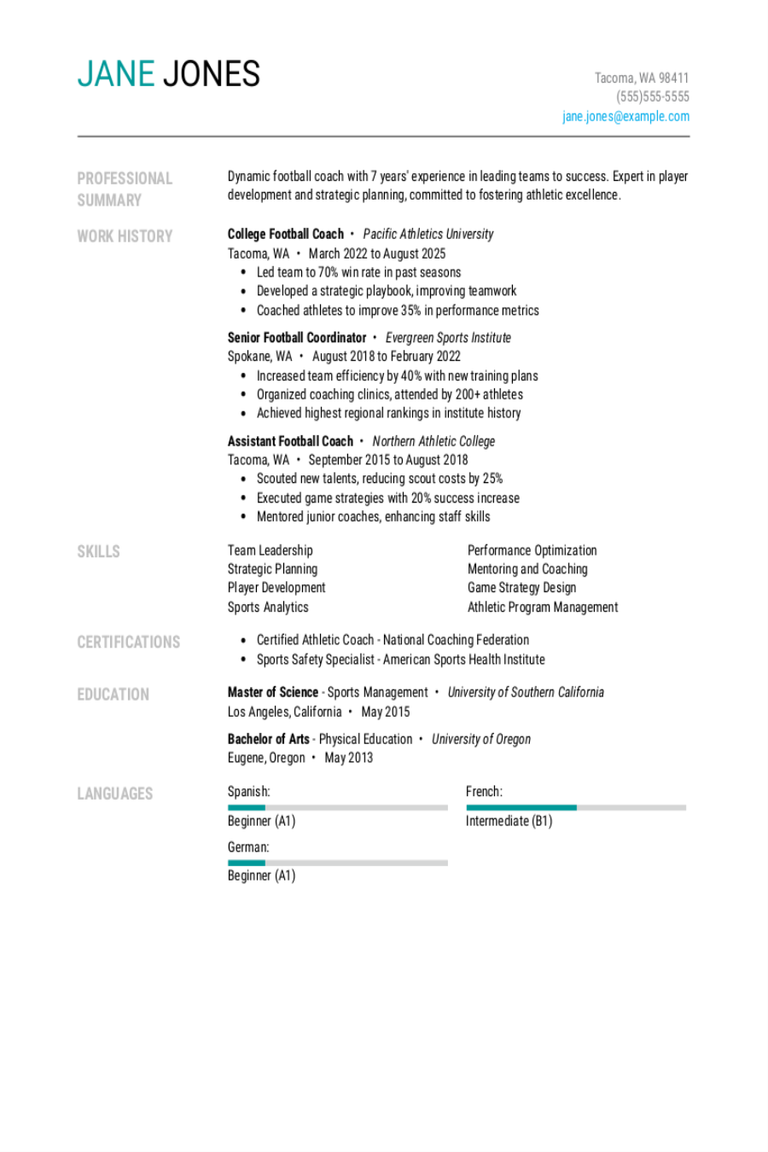
College Football Coach Resume Examples & Templates
Discover college football coach resume examples and learn how to show hiring teams you’re passionate, experienced, and ready to lead athletes to victory.Build my resumeImport existing resumeCustomize this templateWhy this
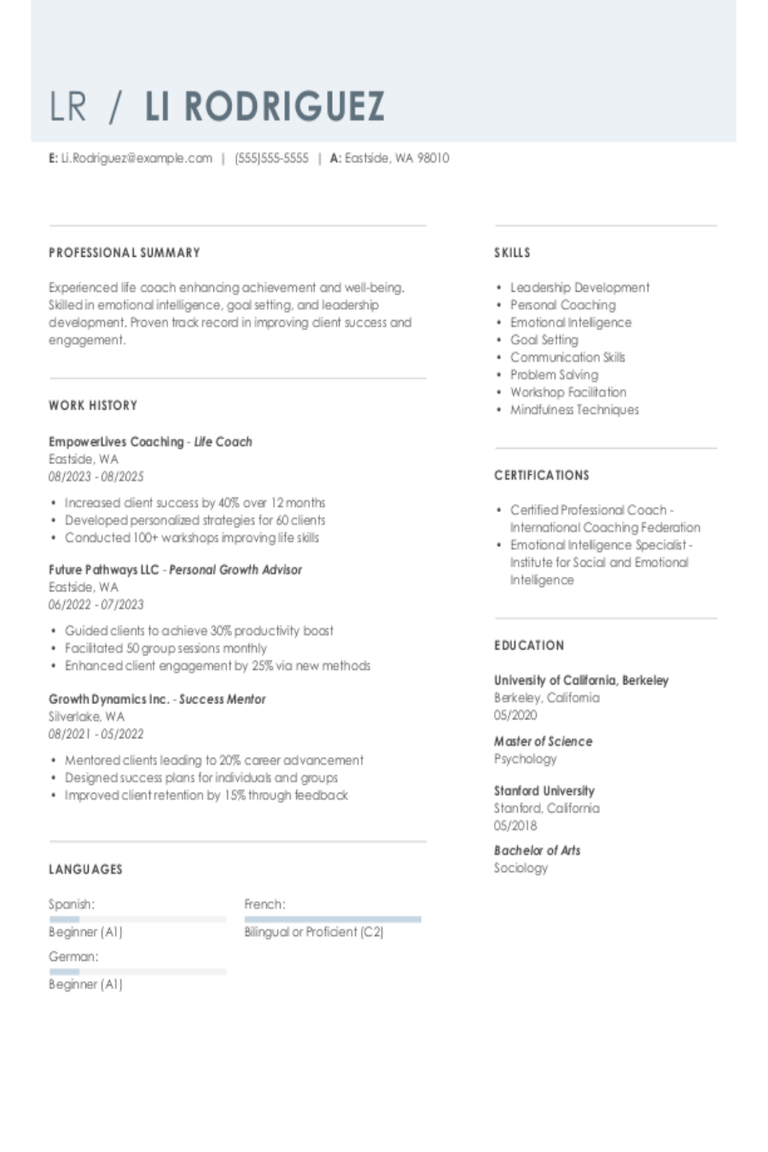
Life Coach Resume Examples & Templates
Discover life coach resume examples and tips that will help you create a resume that highlights your coaching skills and experience effectively.Build my resumeImport existing resumeCustomize this templateWhy this resume
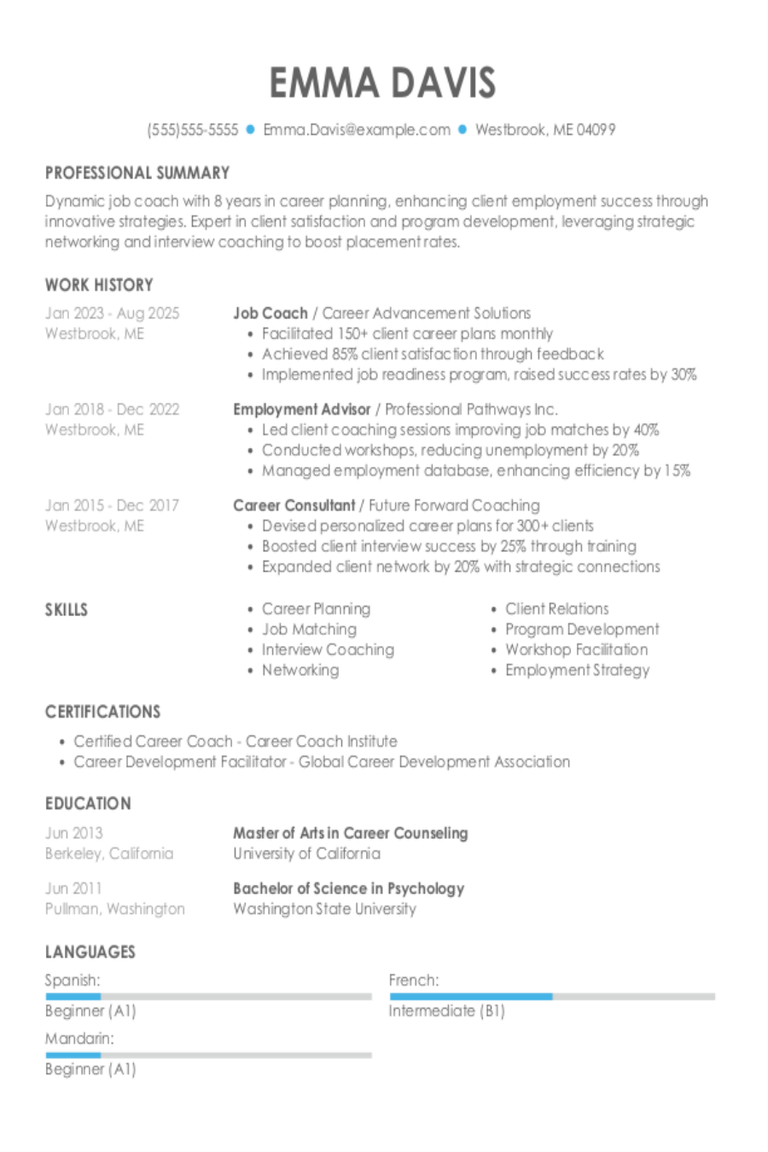
Job Coach Resume Examples & Templates
Browse job coach resume examples and learn how to highlight your coaching skills, experience with job placements, and success in helping clients achieve their goals.Build my resumeImport existing resumeCustomize this
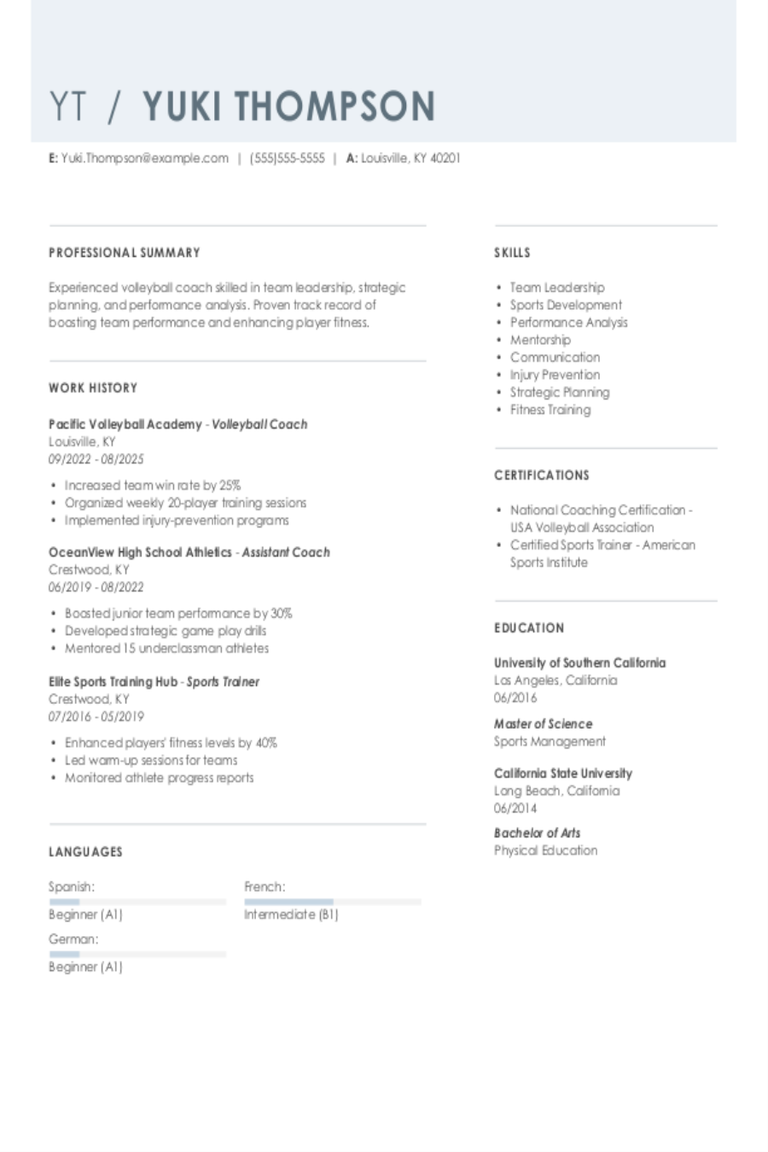
Volleyball Coach Resume Examples & Templates
Browse volleyball coach resume examples and tips to learn how to highlight your coaching skills, team leadership, and game strategy experience in a way that stands out.Build my resumeImport existing
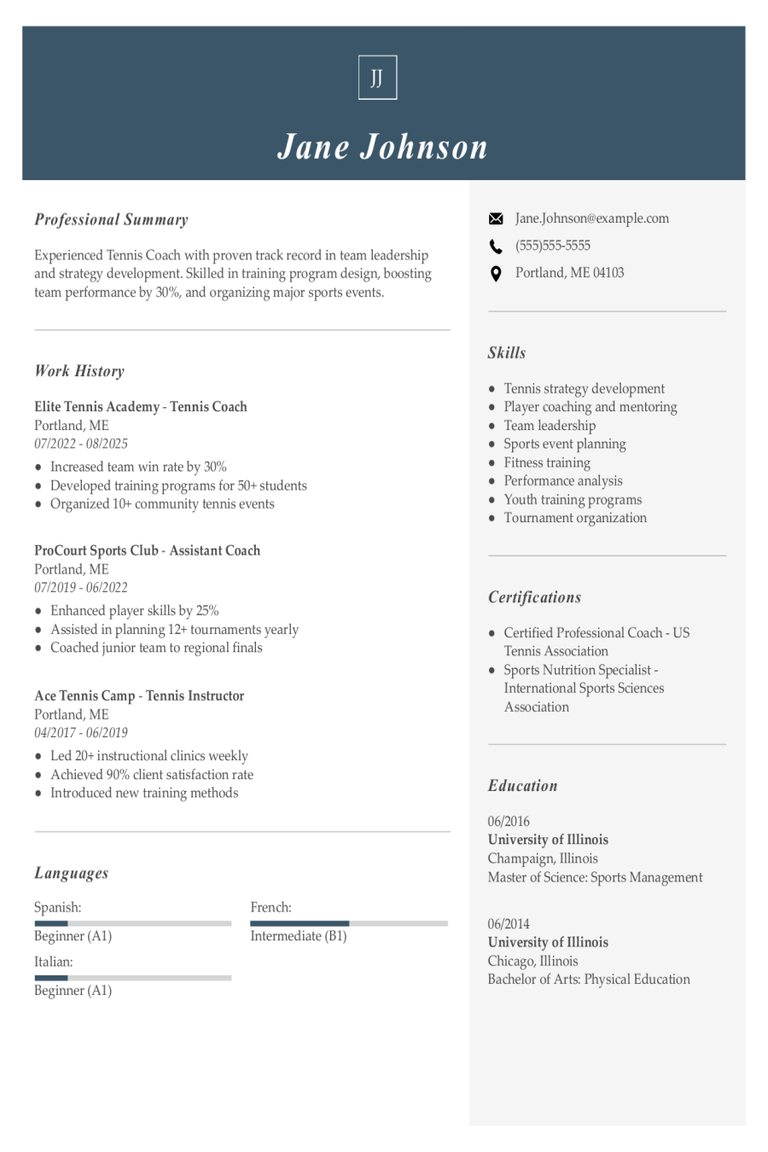
Tennis Coach Resume Examples & Templates
Discover tennis coach resume examples and learn how to highlight skills like teaching techniques, analyzing player performance, and planning training sessions.Build my resumeImport existing resumeCustomize this templateWhy this resume
